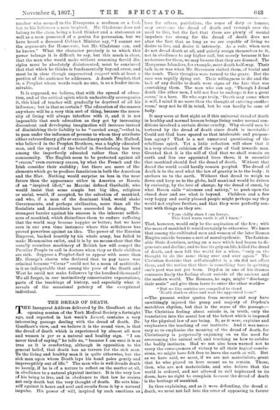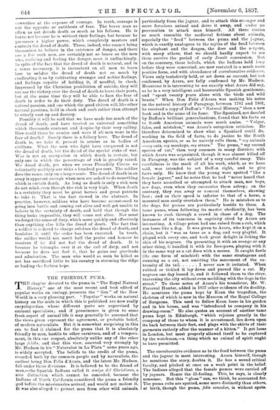THE DREAD OF DEATH.
THE Inaugural Address delivered by Dr. Goodhart at the opening session of the York Medical Society a fortnight ago, and reported in last week's Lancet, contains a very interesting passage dealing with the dread of death. Dr. Goodhart's view, and we believe it is the sound view, is that the dread of death which is experienced by almost all men and women is per se a natural and healthy sign. "I am never tired of saying," he tells us, "because I am sure it is as true as it is comforting, although in opposition to the general belief, that death has no terrors for the sick man. To the living and healthy man it is quite otherwise, but the sick man upon whom Death lays his hand pales gently and imperceptibly out of life." The man who is well dreads death so keenly, if he is of a nature to reflect on the matter at all, in obedience to a natural physical instinct. It is the very law of his being to live, and in obedience to that law he resists not only death but the very thought of death. He sets him- self against it heart and soul and recoils from it by a natural impulse. His power of will, inSpired by such emotions as
love for others, patriotism, the sense of duty or honour, may overcome the dread of death and triumph over the need to live, but the fact that there are plenty of mental impulses too strong for the dread of death does not alter the fact that as long as we are capable of living we desire to live, and desire it intensely. As a rule, when men do not dread death at all, and quietly resign themselves to it, not in obedience to any higher call, but merely because it has no terrors for them, we may be sure that they are doomed. The Marquesas Islanders, for example, meet death half-way. Their talk is, or was when Mr. Stevenson visited them, of burial and the tomb. Their thoughts were turned to the grave. But the race was rapidly dying out.. Their willingness to die and the lack of any dislike to death were signs of the fate that was overtaking them. The man who can say, 'Though I dread death like other men, I will not fear to undergo it for a great cause,' is a hero. He who says truly, Death may come when it will, I mind it no more than the thought of entering another room,' may not be ill in mind, but he can hardly be Bane of body.
It may seem at first sight as if this universal dread of death in healthy and normal human beings living under normal con- ditions involved a certain divine cruelty. Why should men be tortured by the dread of death since death is inevitable ? Could not God have spared us that intolerable and purpose- less agony ? That is a not unnatural questioning of the rebellious spirit. Yet a little reflection will show that it is a very absurd criticism of the ways of God towards man. Granted that it is the will of God that we shall remain on earth and live our appointed lives there, it is essential that mankind should feel the dread of death. Without that dread the world could hardly remain peopled. The dread of death is to the soul what the law of gravity is to the body : it anchors us to the earth. Without that dread to weigh us down and keep us to the globe, half mankind would be driven by curiosity, by the love of change, by the dread of ennui, by what Bacon calls "niceness and satiety," to push open the closed door and see what is beyond. Children and a few very happy and easily pleased people might perhaps say they would not explore further, and that they were perfectly con- tent with things as they are.
"Your chilly stars I can fore,,e.
This kind warm earth is all ".1 know."
That, however, would only be the aspiration of the few ; with the mass of mankind it would certainly be otherwise. We know that among the cultivated men and women of the later Roman Empire suicide became a sort of moral epidemic. The fashion- able Stoic doctrines, acting on a race which had begun to de- generate and decline, and to lose its grip on life, killed the dread of death, and men left the world for a whim, "only on the thought to do the same thing over and over again." The Christian doctrine that self-slaughter is a sin did not affect them, and the notion that there is something base in quitting one's post was not yet born. Dryden in one of his dramas contrasts finely the feeling about suicide of the ancient and the modern world. The Romans, he says, might "discharge their souls" and give them leave to enter the other world-
" But we like sentries are compelled to stand 'Neath starless skies and wait the appointed hour." —The present writer quotes from memory and may have unwittingly injured the pomp and majesty of Dryden's matchless rhythm, but that is the sense of the passage.— The Christian feeling about suicide is, in truth, only the translation into the moral law of the behest which is imposed by the physical law of our being. It, as it were, explains and emphasises the teaching of our instincts. And it was neces- sary so to emphasise the meaning of the dread of death, for Christianity is perpetually enjoining on us the need for overcoming the animal self, and teaching us how to subdue the bodily instincts. Had we not also been warned not to carry the consequences of victory to all their logical conclu- sions, we might have felt free to leave the earth at will But as we have said, we must, if we are not materialists, grant that he who placed us here meant us to remain. Those, then, who are not materialists, and who believe that the world is ordered, and not allowed to roll haphazard to its doom, have no right to complain because the dread of death is the heritage of mankind.
In thus explaining, and as it were defending, the dread death, we must not fall into the error of appearing to favour cowardice at the expense of courage. In truth, courage is Dot the opposite or antithesis of fear. The brave man as often as not dreads death as much as his fellows. He is brave not because he is without their feelings, but because he possesses a higher power, which completely masters and (controls the dread of death. Those, indeed, who cannot bring themselves to believe in the existence of danger, and there are a fee- such men, are certainly not so brave as the men who, realising and feeling the danger, meet it unflinchingly. In spite of the fact that the dread of death is natural, and in a sense necessary, it is incumbent on all men to learn how to subdue the dread of death not so much by eradicating it as by cultivating stronger and nobler feelings, and feelings capable of holding it, if needful, in check. Impressed by the Christian prohibition of suicide, they will not use the victory over the dread of death to leave their posts, but at the same time they will be able to face the fear of death in order to do their duty. The dread of death is a natural passion, and one which the good citizen will, like other natural passions, hold in check and curb rather than attempt to utterly root up and destroy.
Possibly it will be said that we have made too much of the dread of death, and have treated as universal something which thousands contemn and despise by their very calling. How could there be armies and wars if all men went in the fear of death ? Surely there is a fallacy here. The dread of death is, we take it, present in armies as in bodies of civilians. What the men who fight have conquered is not the dread of death, but the dread of the special risks of war. War is not an occupation in which death is certain, but only one in which the percentage of risk is greatly raised. We dread death, yet when we cross Piccadilly Circus we voluntarily multiply our risks a hundred per cent. The soldier does the same, only on a larger scale. The dread of death in an army is apparent enough when men are asked to do something which is certain death. As long as death is only a risk men do not mind, even though the risk is very high. When death is a certainty they must be great heroes and great patriots to take it. That is the fact viewed in the abstract. In practice, however, soldiers who have become accustomed to going into battle and coming out alive and well get unable to believe in the certainty of death, and hold that though the thing looks impossible, they will come out alive. Nor must we forget the sense of duty, which more quickly and effectively than anything else kills the dread of death. The fact that a soldier is ordered to charge subdues the dread of death, and banishes it until the order has been executed. In truth, the soldier would not merit half the praise and honour he receives if he did not feel the dread of death. It is because he triumphs over it at the call of duty, and not because he does not feel it, that he gains our gratitude and admiration. The man who would as soon be killed as not has sacrificed little to his country in storming the ridge or leading the forlorn hope.























































 Previous page
Previous page